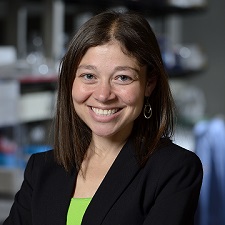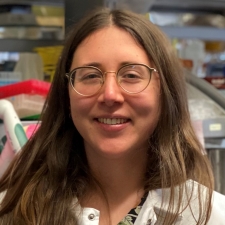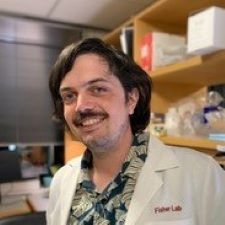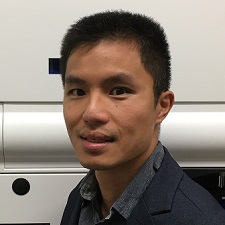Jamie B. Spangler, PhD

Groundbreaking advances in immunotherapy have revolutionized the treatment of cancer. In particular, new antibody drugs that block immunosuppressive pathways have achieved remarkable success in reawakening the immune system to clear tumor cells, leading to lasting cures in patients whose cancers do not respond to any other therapies. Unfortunately, the majority of patients (>70%) do not respond to immunotherapy treatment. It is difficult to predict which patients will benefit, creating an urgent demand for novel immunotherapy drugs that act through alternative mechanisms. Dr. Spangler is working to develop a class of antibody therapeutics that target cancer-promoting pathways in a different way than all current immunotherapies, with the goal of drastically expanding the percentage of cancer patients who benefit from them.
Catherine Triandafillou, PhD

When an organism is developing, it must correct mistakes that might occur at the level of individual cells or tissues. Dr. Triandafillou [National Mah Jongg League Fellow] wants to better understand how error correction systems work, and why they might not work in cases like cancer. To explore these developmental questions, Dr. Triandafillou uses what are called gastruloids, 3D clusters of stem cells that can organize themselves and transform into the basic building blocks of an organism. She developed a method using microscopy to trace the history of these cells and measure how much their past state and history influence what they become. Dr. Triandafillou wants to see how differences in individual cells might impact what those cells eventually turn into, and how such differences affect the correction of mistakes like abnormal growth, bias in cell types, or missing cell types. She is also interested in how the cells around an error react to it. Dr. Triandafillou received her PhD from the University of Chicago and her BS from Temple University.
Siqi Li, PhD
Dr. Li [The Mark Foundation for Cancer Research Fellow] studies signaling events regulating the competition between cells carrying cancer-causing mutations and normal cells during cancer initiation. Previous studies have shown that intercellular signaling between mutant and normal cells could regulate the proliferation of these cells and shape the outcome of cancer initiation. Dr. Li is adapting novel tools to identify what molecular cues are mediating this crosstalk and how they contribute to cancer growth in mouse skin. Understanding these events may guide the development of cancer prevention strategies that restrict the early expansion of mutant cell lines in skin and other tissues. Dr. Li received her PhD from Duke University and her BS from Tsinghua University.
Charles H. Adelmann, PhD

Skin cancer is the most common type of cancer worldwide, and sun exposure is known to be one of the main risk factors for developing skin cancers. Melanin pigment gives our hair, eyes, and skin their color, and it also shields skin cells from the carcinogenic effects of sun exposure. Combining just one enzyme (tyrosinase) and two substrates (oxygen and tyrosine) in the lab results in the generation of melanin—yet we know that dozens of other proteins affect pigmentation in humans. How does a process that requires so few components in vitro utilize these other factors in the human body? Dr. Adelmann’s work focuses on the cellular and biochemical contributors to human pigmentation, a clearer understanding of which will facilitate chemopreventative interventions for skin cancer that manipulate or mimic the anti-cancer properties of pigmentation. Dr. Adelmann received his PhD from Massachusetts Institute of Technology and his BA from Rice University.
Alexander C. Huang, MD

Immune checkpoint inhibitors (ICI), like anti-PD-1 therapy (αPD-1), have transformed clinical oncology by inducing long-term remissions, even in metastatic disease. However, fewer than 40% of cancer patients achieve such long-term remission with αPD-1, and immune-related toxicity limits more aggressive combined approaches, such as anti-PD1 and anti-CTLA-4 therapy. The question remains why a large portion of the immune response generated by combination immunotherapy is directed towards toxicity rather than anti-tumor immunity. A better understanding of the T-cell response to ICI is needed to develop safer and more effective treatment strategies. In humans, CD8+ T-cells are responsible for anti-tumor immunity. Dr. Huang is investigating the immune responses of different types of CD8+ T-cells to αPD-1 and whether they play a role in determining clinical efficacy and immune toxicity.
